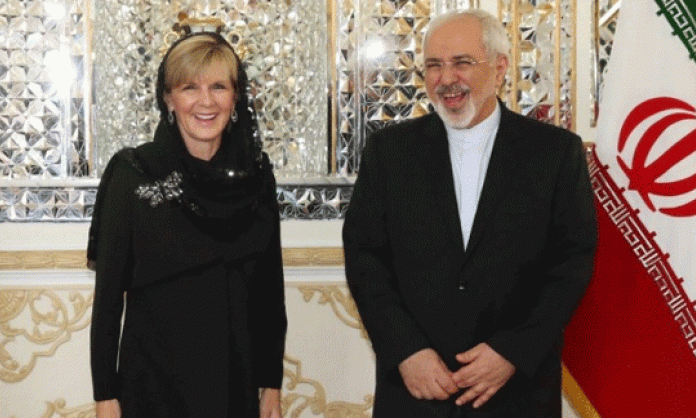If you want an example of how the cold calculations of money and power trump ideology on the Australian right, look no further than foreign minister Julie Bishop’s official trip to Iran earlier this month.
Hardly a day goes by in Australia without a new round of crazy-eyed pronouncements warning us that halal certified vegemite is funding an army of jihadist dole bludgers, or that municipal councils are imposing sharia law at the local swimming pool. Islamist extremism, we are told, is a clear and present danger to the Australian way of life.
And yet there it was. Julie Bishop – second in charge of a government whose oddities and obsessions usually march lock step with those of the US Republican right – sauntering off for a three day meet-and-greet with a regime the US right and its fanatical Likud Party cheer squad (in both the US and Australia) insist is an Islamo-fascist terrorist state committed to nuclear confrontation with Israel and the West.
What was even more remarkable than the trip itself was the reaction from the right. It is true that Andrew Bolt, indefatigable in his defence of feminist principles, had a bit of a whine about Bishop wearing a veil. And the ultra-Zionist Australian Jewish establishment leaders made a few tepid statements expressing their hope that Bishop would raise her opposition to Iran nuking Tel Aviv.
But by and large, criticism was muted when not entirely mute. Not a single major right wing or Zionist figure came out and said the visit should not have happened.
How to explain this seeming incongruity?
As with many things, “follow the money” is not a bad place to start. Fearmongering about Muslim extremism is all well and good from the point of view of the Australian business elite to whom the Liberal Party answers, but not if it gets in the way of a potentially profitable enterprise.
Australian business is salivating at the money-making possibilities in a post-sanctions Iran. A key area is mining development. Iran now has the greatest proven reserves of natural gas in the world, and a substantial array of mineral assets. But it is underdeveloped. Australia, on the other hand, is predicted to be the biggest exporter of natural gas in the world by 2017, and has a highly sophisticated mining sector.
As Sam Barden wrote in the Financial Review last year, the “opportunity is huge for cross-pollination of investment as well as extraction efficiency gains in iron ore, copper, gold, coking coal and, of course, oil and gas – to name a few. Iran has, and is setting up more, international free trade zones for foreign investment, development and trade in oil and gas, coking coal, transport and pipeline infrastructure development.
“Iran enjoys geographically a natural grid for resource distribution that is without peer in the region and probably the world. Yet it remains underfunded and underdeveloped. Savvy Australian companies can capitalise on these opportunities with the provision of technology and best practice infrastructure development, with pipelines and rail transport.”
Mining is only one area of interest to Australian business. Australian trade links with Iran go back to the 1950s, and largely survived the US/Iranian hostilities that began with the 1979 revolution. Trade considerations have resulted in Australia maintaining strong diplomatic and business relations with Iran for more than half a century, in spite of the bitter hostility between Iran and the US, Australia’s most important ally.
That is not to say geopolitical considerations are not important. Australia went along with the post-2008 UN sanctions, and even imposed some of its own. But the tide has turned, and the US ruling class is determined to cut a deal that ends the cold war with Iran. The Republican right and the Zionist lobby might be screaming, but their concerns reflect sectional interests and ideological hang-ups that are a luxury afforded only to oppositions. If there was a Republican in the White House today, they would be cutting a deal with the Ayatollahs as well.
The Liberal Party in Australia would doubtless be putting on the same hysterical obstructionist show as the Republicans if they were in opposition and it was a Labor foreign minister travelling to Tehran. But being in government means you answer to the ruling business establishment, not just to the polls and the shock jocks.
And as the toadying acquiescence to Bishop’s Iran trip by the Australian right’s warriors-against-Islam shows, when it comes down to it, they too will not only jump when their business masters say jump – they will shut up when they are told to as well.





